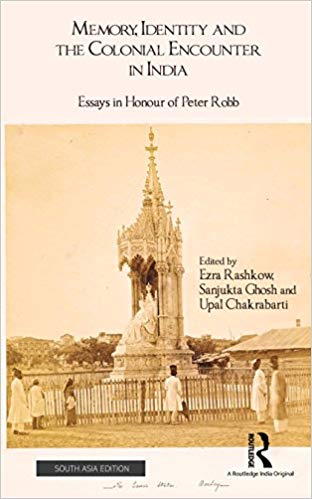This volume is a festschrift to Peter Robb for his contribution to the cholarship on the history of South Asia. Robb who retired from SOAS was a cherished mentor and colleague, and this book, the culmination of a remarkable collaborative effort, is testament to that fact. The range of subjects on which Robb has written is truly impressive and stretches from the sturdy realm of agrarian history to ruminations on memory, history and identity in colonial and postcolonial India. Robb also continues to write on the somewhat unfashionable subject of the British in India, his work ranging from colonial policies, most notably the Montagu Chelmsford reforms, to the worldview and sensibilities of Englishmen in the colony. The most impressive example of the latter is his recent study of the diaries of Richard Blechynden, the 19th century architect and surveyor in Calcutta. It hardly needs saying that Robb’s work is not meant to restore the white man to his proper place at the centre of histories of empire; instead he seeks to draw our attention to the deeply entwined relationship between Indians and the British during the period of colonial rule in India. This is scholarship that is much more nuanced than Clive Dewey, Robb’s long-time colleague at SOAS, seems to suggest in his introductory remarks. Dewey ends up sounding ludicrously sour about recent trends in South Asian history writing, asking ‘how many times, in the last 30 years, has a university given a job to the author of a thesis on white men in South Asia, however good it may have been? The history of “British India”, as a result is the Prince of Denmark with Hamlet left out…’ (p. xvi). The volume and Peter Robb deserved a better foreword.
In the introduction, the editors argue that the essays in the volume attempt to see the colonial encounter as a complex, negotiated, processual and contested one that fundamentally transformed both the colonizer and the colonized. There is no doubt that this is an important conceptual framework to understand British rule in India. The editors and Robb himself indicate that they see its assertion as a corrective to an understanding of British rule as fundamentally transforming the nature of Indian society and culture. I would argue, however, that this reading is a simplistic view of the work of Bernard Cohn and those influenced by him. It also straitjackets the fascinating material that the scholars in this volume have written about into a colonial state as imposition perspective versus one that focuses on the dialogic character of rule. While it could be argued that some scholars have overemphasized the colonial state’s ability to remake Indian society, the most important contribution of the oeuvre is to insist that the historian be sensitive to the fact that colonialism is constituted by unequal and hierarchical power relations even in explorations of native agency, or the heterogeneity of colonial official attitudes.

